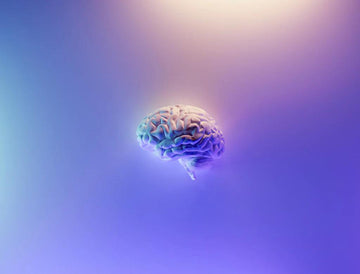Have you ever noticed that when your brain isn’t working, it affects your entire self? Your body doesn’t have the energy it usually does. You feel emotionally off. You want to just hit restart on the whole day. That’s why a healthy brain is so important for your overall health. So let’s talk about if you have a healthy brain, and what you can do if you don’t.
What Does “Healthy Brain” Mean?
A “healthy brain” refers to a state in which the brain functions optimally, supporting cognitive abilities, emotional well-being, and overall mental health.
Basically, your brain does what you need it to do.
When your brain is healthy, you’re able to better understand what you’re reading or hearing. You can remember where you put your keys. You remember why you entered a room.
On a more serious level, a healthy brain is free from neurodegenerative diseases or disorders that significantly impair your cognitive function, like Alzheimer's disease or dementia.
A healthy brain is also closely tied to mental well-being. This includes emotional stability, resilience to stress, and the ability to manage emotions effectively. A healthy brain enables individuals to maintain healthy relationships, cope with challenges, and experience a sense of fulfillment and purpose in life.
When you have a healthy brain, it’s much more likely life feels fulfilling, peaceful, and productive.
Your Brain When It’s Unhealthy
When you don’t take care of your brain, it can lead to downsides that will drastically decrease your standard of living. When the brain fails to operate, it affects your entire self.
Here are some specific ways an unhealthy brain can affect you…
Overall Cognitive Impairment
An unhealthy brain may experience a decline in cognitive abilities, including memory loss, difficulty concentrating, decreased problem-solving skills, and reduced processing speed. Cognitive impairments can impact daily functioning and overall quality of life.
Neurodegenerative Diseases
If your brain is unhealthy, you’ll be more susceptible to neurodegenerative diseases, like Alzheimer's disease, Parkinson's disease, Huntington's disease, or multiple sclerosis. These conditions can cause progressive damage to brain cells, leading to a range of cognitive and physical symptoms.
Mental Health Disorders
An unhealthy brain can contribute to developing or exacerbating mental health disorders. Conditions like depression, anxiety, bipolar disorder, schizophrenia, and others can arise due to imbalances in brain chemistry, genetic factors, or environmental influences.
Poor Emotional Well-Being
A compromised brain health can disrupt emotional regulation, leading to mood swings, emotional instability, irritability, or difficulty managing stress. Emotional well-being and resilience may be significantly affected.
Reduced Quality of Life
With an unhealthy brain, you may face challenges in your personal and professional life. You can end up struggling with keeping relationships, performing everyday tasks, and achieving personal goals, leading to a diminished overall quality of life.
Decline in Motor Skills
Brain health issues can impair your motor skills and coordination. This may manifest as difficulties with balance, coordination, fine motor control, or muscle weakness.
Communication and Language Difficulties
Certain brain disorders can affect communication and language skills. This may result in difficulties expressing yourself, understanding others, or finding the right words to convey thoughts and ideas.
Behavioral Changes
Unhealthy brain states can lead to changes in behavior, like impulsivity, aggression, apathy, or social withdrawal. These changes can significantly impact interpersonal relationships and social interactions.
10 Tips To Help You Have a Healthy Brain
Okay, let’s make this practical. Let’s talk about how to keep a healthy brain over time.
Maintain a Balanced Diet
Consume a nutrient-rich diet that includes fruits, vegetables, whole grains, lean proteins, and healthy fats. Omega-3 fatty acids, found in fish, nuts, and seeds, are particularly beneficial for brain health.
Stay Physically Active
Engage in regular physical exercise because it promotes good blood flow to the brain and helps stimulate the growth of new brain cells. Aim for at least 150 minutes of moderate-intensity aerobic activity per week. In other words, take a walk around the block every day.
Get Sufficient Sleep
Prioritize quality sleep as it allows the brain to rest, consolidate memories, and repair itself. Aim for 7-9 hours of uninterrupted sleep per night to support optimal brain function.
Challenge Your Brain
Engage in activities that stimulate your brain, like puzzles, reading, learning new skills, or playing strategic games. These activities help to maintain and improve cognitive function.
Manage Stress
Chronic stress can have a negative impact on your brain health. Practice stress management techniques like deep breathing, meditation, yoga, or engaging in hobbies to reduce stress levels and promote brain health.
Stay Socially Engaged
Maintain social connections and engage in social activities regularly. Social interaction provides mental stimulation, emotional support, and can help reduce the risk of cognitive decline.
Protect Your Head
Take necessary precautions to prevent head injuries. Wear protective gear during sports activities and practice safe driving habits to minimize the risk of traumatic brain injuries.
Limit Alcohol Consumption
Excessive alcohol consumption can damage brain cells and impair cognitive function. Keep alcohol consumption moderate or avoid it altogether to promote brain health.
Quit Smoking
Smoking has harmful effects on cardiovascular health, which can negatively impact brain function. Quit smoking to reduce the risk of cognitive decline and other brain-related disorders.
Try Microdosing
Microdosing is when you take a small amount of a plant extract in order to support your health. And there are plenty of plant extracts that support long-term brain health, especially one called Shilajit.
Shilajit = Healthy Brain
Shilajit is a sticky, tar-like substance that’s commonly used in traditional Ayurvedic medicine. It’s primarily found in the Himalayan region, formed over centuries by the decomposition of plant and microbial matter. Shilajit is rich in minerals, trace elements, amino acids, fulvic acid, and other organic compounds.
In Ayurveda, Shilajit is considered a potent rejuvenator and an adaptogen, which means it helps the body adapt to stressors and promotes overall well-being. It has been used for centuries in Ayurvedic medicine to support many aspects of health, including vitality, energy, and reproductive health.
But, when taken correctly, it’s especially useful in helping people maintain a healthy brain and long-term cognitive function.
Where To Find Shilajit

You can’t simply pick up some Shilajit at the grocery store and sprinkle it on your salad. If you want it to promote brain health and keep your noggin functioning well in the long run, you have to be more intentional.
That’s why we highly encourage microdosing Shilajit. You take it just like a liquid supplement.
Take one dropper a day of the Lion’s Mane Tonic, Reishi Tonic, and/or Cordyceps Tonic and your brain will have an extra layer of support and protection.
These three tonics together are called the Biohacker Set, and they will help you…
- Remember things better
- Concentrate and get more done
- Regenerate brain cells
- Sleep better
- And so much more…
Simply put, these tinctures will help you have a healthy brain!




